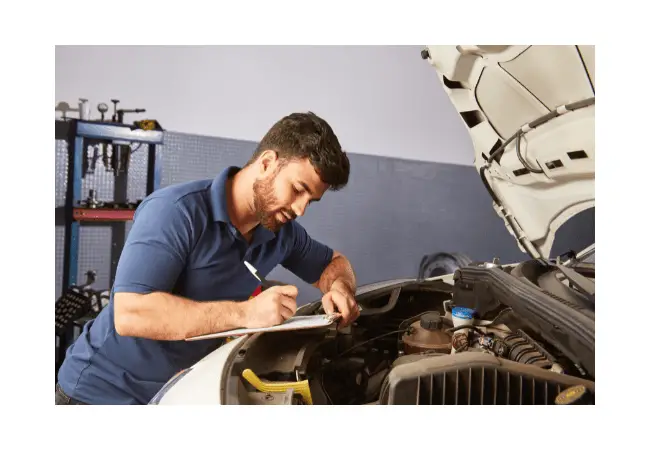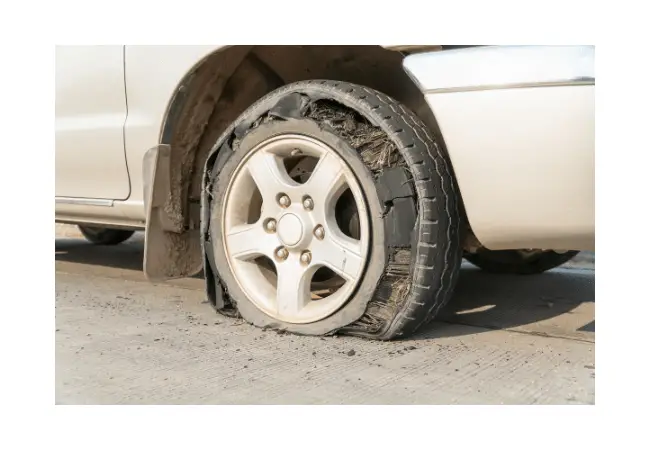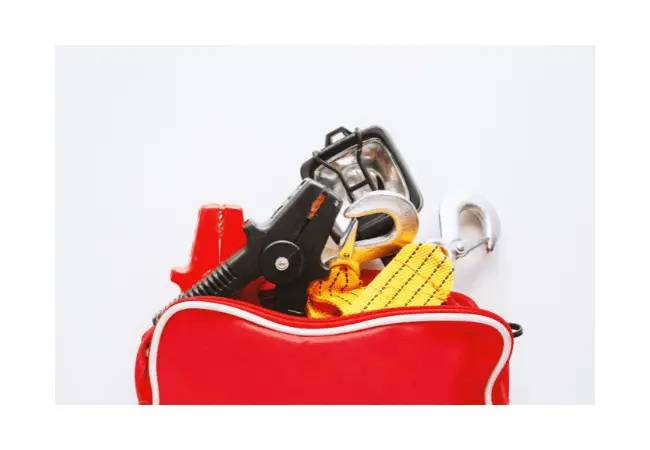Picture this: you’re cruising down the highway on a much-anticipated road trip when suddenly, a dashboard warning light flickers on, or worse, your car grinds to a halt. We’ve all been there, and it’s never a pleasant experience. But what if you could avoid these most common car problems on road trips by taking the proper precautions before hitting the road? In this blog post, we’ll guide you through essential pre-trip car checks, discuss common road trip car issues and their solutions, and cover the importance of navigation and emergency preparedness. Buckle up and let’s get started.
Jump To
Short Summary
- Essential pre-trip car checks ensure a safe and smooth journey.
- Navigation and emergency preparedness are key components of successful road trips.
- Professional maintenance, inspection, and being aware of warning signs help to prevent common car issues on the road.
Essential Pre-Trip Car Checks

Before embarking on a road trip, it’s crucial to ensure that your car is in tip-top shape. The last thing you want is to be stranded on the side of the road with a flat tire, dead battery, or overheating engine.
To avoid these common car problems, there are three essential pre-trip car checks you should perform: battery inspection, tire maintenance, and fluid levels and quality. By taking the time to inspect these elements, you’ll minimize the risk of encountering issues on the road and ensure a safer, smoother journey for you and your passengers with an engine tune-up.
Battery Inspection
A car battery is a vital component of your vehicle’s operation, and a dead battery can leave you stranded in undesirable circumstances. That’s why it’s essential to inspect your car’s battery before a road trip to avoid unexpected failures. To check the battery’s condition, examine its age, charge level, and terminal connections. If the battery is low, consider recharging it at a battery shop or replacing it if it’s approximately two years old. Additionally, avoid leaving lights on, unplug devices when not in use, and refrain from using electronics when the car is off to prevent battery drain.
Maintaining a properly charged battery is not only essential for avoiding breakdowns but also for keeping the car’s air conditioner running on hot days. No one wants to be stuck on the side of the road on a sweltering day without the comfort of cool air! So, make sure to have your battery checked before your long trip and invest in a portable charger as a backup.
Tire Maintenance
Tire maintenance is crucial for the safety and performance of your vehicle during a road trip. Poorly maintained tires can result in a flat tire or even a blowout, putting you and your passengers at risk. To ensure your tires are road trip-ready, check the tire pressure, and treadwear, and look for any signs of damage. Use a tire gauge to measure the pressure and adjust it according to the manufacturer’s recommendations. Proper tire pressure not only helps avoid tire failure but also improves fuel efficiency.
Before setting off on your journey, it’s a good idea to have a courtesy checkup to ensure your tire pressure is accurate and your tires are not overly worn. A professional inspection may even recommend a set of DriveGuard run-flat tires, which allow you to continue driving up to 50 miles at speeds of up to 50 MPH in the event of a puncture or complete air loss. Having these tires can provide you with peace of mind during your road trip adventures.
Lastly, always carry a spare tire, tire wrench, and car jack in your vehicle. Knowing how to change a flat tire and having the necessary tools on hand can save you time and stress in case of an emergency.
Fluid Levels and Quality
Checking fluid levels and quality is another essential pre-trip car check to ensure your car runs smoothly and efficiently during your road trip. Start by checking the engine oil level and its condition. If the oil is very dark or thick, consider changing it a week before your journey to ensure everything is working properly. Additionally, inspect the coolant levels in your engine’s cooling system, which includes the radiator, auxiliary fan, and radiator hoses. Low coolant levels can lead to engine overheating, so make sure to top off the coolant if necessary.
Transmission fluid and power steering fluid should also be checked before embarking on a long trip. These fluids play a critical role in the smooth operation of your car, and insufficient lubrication can lead to issues such as grinding gears or difficulty steering.
By taking the time to inspect and maintain your vehicle’s fluid levels and quality, you’ll minimize the chances of encountering car problems on the road.
Common Road Trip Car Issues and Solutions
Despite your best efforts to prepare your car for a road trip, unforeseen issues can still arise. Flat tires, engine overheating, and dead batteries are the most common car problems encountered during road trips. Such issues can dramatically reduce your journey experience. Being prepared for these scenarios will help you tackle them quickly and efficiently, allowing you to get back on the road and enjoy your journey.
In the following sections, we’ll discuss how to overcome flat tires, handle engine overheating, and deal with dead batteries.
Overcoming Flat Tires

Flat tires are a common car problem that can occur at any time, especially during road trips where your vehicle is subjected to extended use and varying road conditions. To overcome a flat tire, it’s crucial to know how to change a tire safely and have the necessary tools on hand, such as a tire wrench, car jack, and tire patch kit.
If you’ve opted for DriveGuard run-flat tires, you’ll have the added benefit of being able to continue driving up to 50 miles at speeds of up to 50 MPH after a puncture or complete air loss. This can provide some peace of mind and extra security during your road trip.
However, it’s still important to know how to change a tire and have the necessary tools on hand, as it’s always better to be prepared for any situation.
Handling Engine Overheating
Engine overheating is a very common car issue. It can be experienced during long journeys. Overheating can be caused by low coolant levels, a malfunctioning cooling system, or excessive strain on the engine. It’s essential to be aware of the warning signs of an overheating engine, such as a rise in temperature displayed on the vehicle’s dashboard, louder engine noise, unusual smell, reduced power output, and steam or smoke from beneath the hood.
If you notice any of these warning signs while driving, it’s important to take action immediately to prevent further damage to your car. First, turn off your air conditioner and switch on the heater to help dissipate heat from the engine. Next, pull over in a safe location and allow the engine to cool down before inspecting for any coolant or engine oil leakage.
If you’re unsure how to handle the situation, don’t hesitate to call for roadside assistance.
Dealing with Dead Batteries
A dead battery can be a frustrating and inconvenient issue to deal with during a road trip. To avoid being stranded, it’s essential to know how to jump-start your car safely and carry jumper cables in your vehicle. If you’re unable to jump-start your car or don’t have jumper cables, consider calling roadside assistance for help.
In some cases, a dead battery may need to be replaced. To avoid being caught off-guard, it’s a good idea to have your battery checked before your trip and invest in a portable charger as a backup. By taking these precautions, you can minimize the likelihood of dealing with a dead car because your car battery quits during your road trip and ensure a smoother journey.
Brake System Care
Ensuring the proper function of your car’s brakes is crucial for the safety of all passengers during a road trip. Brake system care includes brake inspection and being aware of warning signs that may indicate potential issues with your brake pads.
In the following sections, we’ll discuss the importance of brake inspection and how to recognize warning signs of brake failure.
Brake Inspection
A thorough brake inspection should be conducted before any road trip to ensure the safety of all passengers and avoid endangering them due to brake failure. During a brake inspection, check the brake pads, rotors, and calipers for signs of wear and tear. Additionally, inspect the brake lines for any signs of leakage and ensure there is sufficient brake fluid in the braking system itself.
Many auto care facilities, such as Firestone Complete Auto Care, offer free brake inspections to help ensure your vehicle is safe for the road. By taking the time to have a professional brake inspection, you can identify any potential issues and address them before they become a problem during your road trip.
Warning Signs
Being aware of warning signs indicating brake failure is crucial for maintaining your vehicle’s safety. Some common warning signs include vibration, loud noises, and your car pulling to one side when braking. If you notice any of these signs, it’s important to address the issue promptly to avoid causing additional strain on other components and putting your passengers at risk.
Other warning signs of poor brake performance may include strange noises such as squealing, grinding, or rubbing, vibrations when braking, a soft or spongy brake pedal, longer stopping distances, and warning lights on the front dashboard lights. By staying vigilant and addressing these warning signs, you can ensure the safety of your passengers and avoid brake trouble during your road trip.
Air Conditioning and Cooling System Maintenance
A comfortable and properly functioning air conditioning and cooling system is crucial for an enjoyable road trip, especially during the hot summer months. Ensuring that your car’s air conditioning and cooling system are in good working order before your journey can help prevent issues such as engine overheating and keep your passengers comfortable.
In the following sections, we’ll discuss the importance of performing an A/C system check and cooling system inspection.
A/C System Check
An A/C system check should be done before a road trip to detect any leaks or clogs that may prevent your car’s air conditioner from functioning properly. To inspect the A/C system, check for any strange noises, or leaks, and ensure that the compressor and car air conditioner is in operation. Additionally, inspect the cabin air filter to guarantee that the air in the vehicle is pure and free of contaminants.
If you discover any issues with your A/C system, it’s essential to address them before embarking on your road trip. A well-functioning car air conditioner can make all the difference in the comfort of your passengers during a long drive, so be sure to prioritize this maintenance task.
Cooling System Inspection
A cooling system inspection is crucial to ensuring that your car’s engine operates at the optimal temperature and doesn’t overheat during your road trip. To inspect the cooling system, check the radiator, coolant hoses, and expansion tank for any visible signs of corrosion, wear, or other defects. Additionally, verify the coolant level and top it off if necessary.
By performing a thorough cooling system inspection, you can help prevent engine overheating and ensure the smooth operation of your vehicle during your road trip. A well-maintained cooling system will not only keep your engine cool but also contribute to the overall efficiency and performance of your car.
Proper navigation and emergency preparedness are important aspects of any road trip. Knowing where you’re going and having a plan in case of unforeseen circumstances can help make your journey smoother and less stressful.
In the following sections, we’ll discuss the importance of utilizing GPS and maps for navigation and the essentials of an emergency kit.
Utilizing GPS and Maps
Utilizing GPS and maps can help you avoid getting lost during your road trip, optimize your travel time, and find the most efficient route to your destination. There are many GPS and map applications available, such as Google Maps, which can provide turn-by-turn navigation and offer suggestions based on relevant keywords.
To make the most of your GPS and maps, it’s important to verify your route before embarking on your journey, be aware of any road closures or detours, and ensure that your GPS and maps are up to date. By taking these steps, you can minimize the chances of getting lost and have a more enjoyable road trip experience.
Emergency Kit Essentials

Having an emergency kit in your car is essential for being prepared for any potential car troubles or emergencies during your road trip. An emergency kit should include items such as water, food, a first-aid kit, a flashlight, extra batteries, a whistle, and copies of important documents. A first-aid kit is particularly important in the event of a medical emergency and should include items such as bandages, antiseptic wipes, and pain relievers.
In addition to the essentials, make sure to store your flashlight in a secure location and have additional batteries available. Limit the use of the flashlight to conserve battery power and ensure it’s readily available in case of an emergency. By having a well-stocked emergency kit in your car, you can be better prepared for any unforeseen circumstances that may arise during your road trip.
Summary
In conclusion, proper preparation is key to avoiding common car problems on road trips and ensuring a safe, enjoyable journey for you and your passengers. By performing essential pre-trip car checks, being aware of common road trip car issues and their solutions, and practicing navigation and emergency preparedness, you can confidently embark on road trip preparations for your next adventure. So, before you hit the open road, take the time to follow these guidelines and make your road trip a smooth and memorable experience.
Frequently Asked Questions
What are common road trip car problems?
Road trips can bring with them a range of car issues, from mechanical troubles to unforeseen problems with the vehicle’s infrastructure. Taking steps to regularly maintain your car will reduce the risk of encountering common issues like drained batteries, flat tires, and low fuel.
Regular maintenance can include checking the oil and coolant levels, inspecting the brakes and tires, and ensuring the battery is in good condition. It is also important to make sure that all lights and signals are working.
Are long road trips bad for your car?
The conclusion can be made that long road trips can be bad for your car due to the increased wear and tear it causes. Regular maintenance of the engine, tires and other parts before and after a road trip is essential in order to prevent expensive damage.
How do I know if my car is OK for a road trip?
It is important to check your car’s battery, belts and hoses, fluids and filters, lights and electrical equipment, brakes, and tires before embarking on a road trip. This will ensure that your car is safe for a long journey.
What are top 5 most common automobile problems?
Common car problems such as a bad battery, faulty ignition coils and spark plugs, air and fuel filters, system issues, regular motor oil changes, tire troubles, and exhaust system issues can be a burden on car owners.
Therefore, it is essential to stay informed and up-to-date on these potential car troubles in order to avoid further inconvenience and cost.
